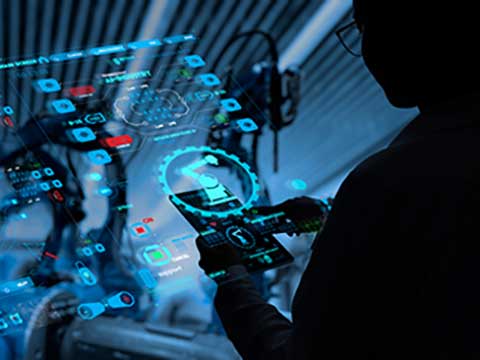
Posted to News on 25th Mar 2024, 14:45
Automation trends in 2024, from AI to the Internet of Things
Recent stats show that 37 per cent of time spent on industrial operations could be automated. Reflecting on recent advancements, Stephen Hayes, managing director of Beckhoff UK, shares insights into how automation trends have begun to shape 2024.

(See Beckhoff at MachineBuilding.Live, 2 October 2024, on stand 43)
Today, businesses leverage automated processes to navigate complex challenges, ensuring accuracy, speed and adaptability in the face of ever-evolving demands. From precision manufacturing to streamlined logistics and responsive healthcare systems, automation is the driving force behind enhanced efficiency and productivity.
In 2024, Artificial Intelligence (AI), sustainability and the Internet of Things (IoT) continue to shape the future of automation and the industries it influences.
The integration of AI into automation represents a revolutionary leap forward in industrial processes and is expected to continue apace in 2024. AI, with its cognitive abilities, enables automation systems to transcend traditional boundaries, enhancing adaptability and intelligence.
This integration empowers machines to not only follow predefined commands but also to analyse, learn and optimise operations in real time. Predictive analytics, machine learning algorithms and advanced decision-making capabilities enhance the efficiency, accuracy and overall intelligence of automation systems.
By seamlessly fusing AI with automation, industries can navigate complex scenarios with heightened precision. This helps to provide insights that drive innovation, transforming the fabric of how we approach industrial processes.
At Beckhoff, this integration is not just a trend but a transformative force that redefines the capabilities of the company's control systems. Beckhoff's TwinCAT Chat enables AI-supported engineering to automate tasks, such as the creation or addition of function block code and even code optimisation, documentation and restructuring.
Through AI, we empower our automation processes with predictive analytics, adaptive learning mechanisms and intelligent decision-making.
Sustainable automation practices
Throughout 2024, sustainability takes centre stage as a non-negotiable factor. Environmental responsibility is becoming increasingly intertwined with automation as industries recognise the importance to minimise the impact of emissions and waste. In automation, sustainability involves optimising energy usage, reducing waste and adopting eco-friendly practices across the entire lifecycle of industrial processes.
Automation technologies, such as energy-efficient motors and drives and smart sensors, enable precise control over resource consumption. Additionally, the implementation of predictive maintenance through automation helps to extend the lifespan of equipment, reducing the need for frequent replacements and minimising waste.
Sustainable automation practices not only align with global environmental goals but also contribute to long-term cost savings and improved corporate responsibility.
Beckhoff's PC-based control technology helps customers to optimise the effectiveness of their processes by reducing energy and raw material consumption while improving quality and profitability.
The integration of sustainability into automation forms the foundation for a greener and more responsible industrial future, which will continue into 2024.
The Internet of Things
IoT plays a crucial role in automation by creating a network of interconnected devices that can communicate and share data in real-time. Throughout 2024 we can expect to see an increase in IoT being integrated into automation systems.
IoT-enabled sensors on machinery can gather real-time data on performance, temperature and energy usage. This data is then transmitted over the IoT network, providing valuable insights for predictive maintenance and process optimisation.
For instance, Beckhoff offers TwinCAT IoT, which supports standardised protocols for cloud communication and for sending push notifications to smart devices. This interconnected ecosystem allows for seamless communication between devices, enabling more intelligent, responsive and efficient automation processes.
Ultimately, the integration of IoT into automation enhances connectivity, data-driven decision-making and the ability to remotely manage and monitor systems, leading to more streamlined and intelligent automated processes.
As we progress through 2024, it's evident how the visions of innovation, sustainability and connectivity converge to shape the future of industrial automation. The seamless integration of AI not only propels us into a realm of intelligent automation but also underlines our commitment to sustainability, ensuring responsible and forward-thinking industrial practices.
The IoT binds these elements into a connected fabric, creating a system where efficiency meets eco-consciousness. We're living in a time where technology serves humanity, where sustainability is not a choice but a necessity, and where a connected, sustainable future is achieved through automation.
Want the latest machine building news straight to your inbox? Become a MachineBuilding member for free today >>

















